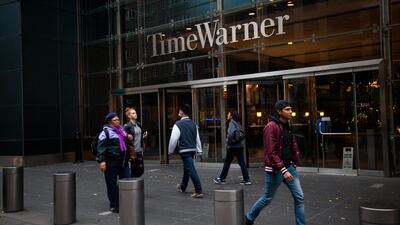Media mergers with telecom companies are big business in the United States these days. The telecommunications giant AT&T agreed this weekend to buy Time Warner, which owns prominent media brands such as HBO and CNN, for $85 billion (Dh312 bn). The merger closes a historic chapter of media consolidation in America and comes at the right time.
When Time Warner was acquired by AOL in 2000 – in one of the first serious fusions of the content and data delivery sectors – the internet was much less pervasive in our everyday lives. Netflix, YouTube and Facebook didn’t exist and their captivating powers were the stuff of science fiction. Today, we spend large portions of our life on the internet and use social media to interact with sources of news and entertainment. Data defines these relationships that grow deeper by the day.
It is natural then for a telecommunications giant such as AT&T (or Comcast, which recently took over NBCUniversal for US$30 billion, or Verizon Communications, which bought the Huffington Post and Yahoo!) to purchase content providers. If data is the primary commodity that these telecoms companies sell, then owning content creators is a perfect fit.
AT&T’s acquisition of Time Warner is still subject to approval by regulators and the process is expected to be rigorous. With the steady stream of media acquisitions, there will be renewed debate about net neutrality, or safeguards to ensure that access to the web and data traffic speeds are kept equal for all content providers. One fear is that telecom giants enable faster data speeds for their own content, thus creating tiers of web infrastructure that could harm smaller sites.
Regardless of the regulation debate, one thing is abundantly clear. Telecommunications companies are focused on data above any other product. Gone are the days of telecoms investing in traditional phone calls. As more people turn to the web for communication, information and entertainment needs, data will emerge as one of the most valuable products in the economy.

